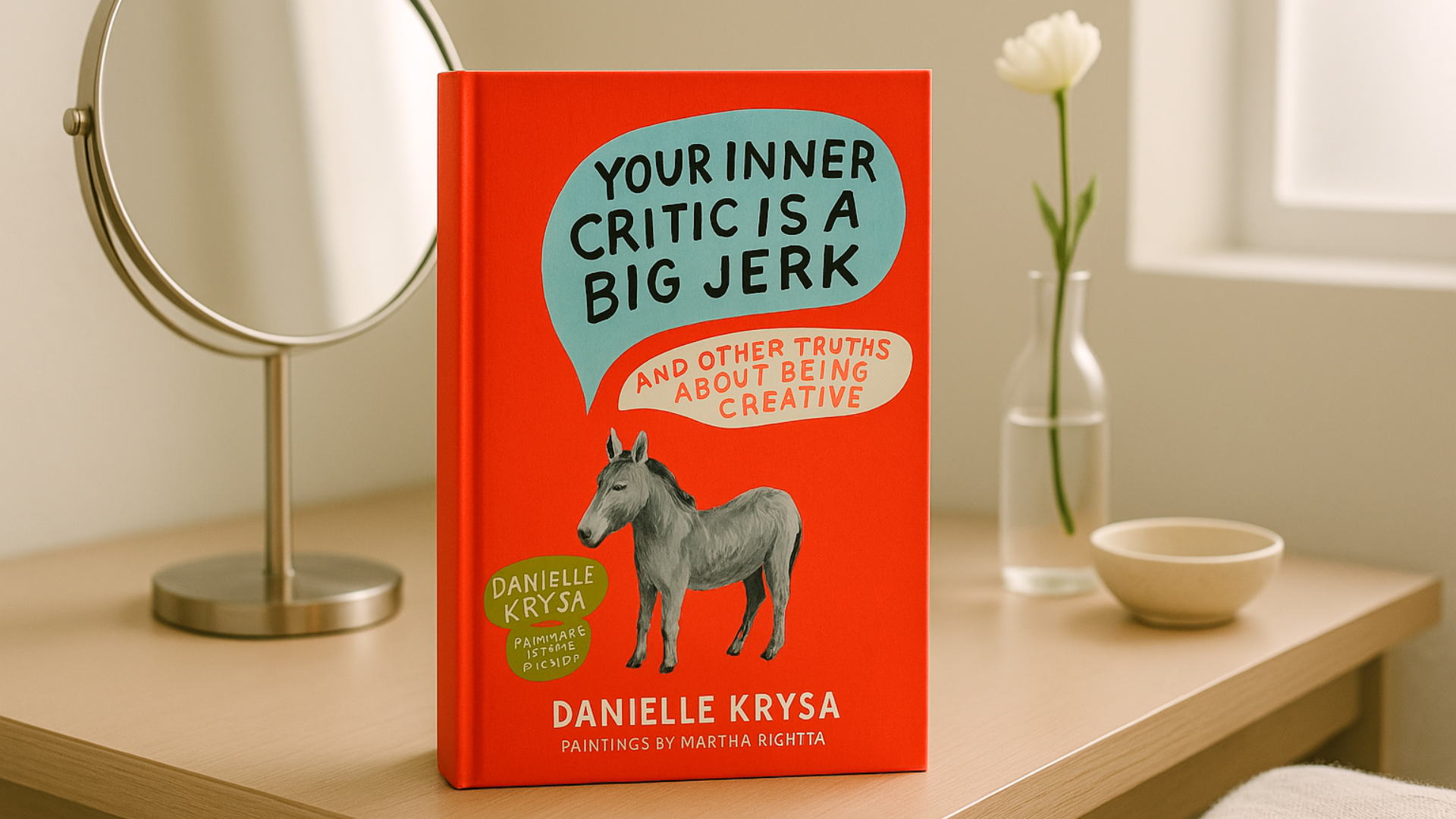The Perfect Read When You’re Afraid to Start Creating

Book Review: Your Inner Critic Is a Big Jerk by Danielle Krysa
A playful and affirming guide to reclaiming your creative confidence
Danielle Krysa’s Your Inner Critic Is a Big Jerk offers a refreshingly candid and accessible take on the creative process. Known for her art blog The Jealous Curator, Krysa writes from the trenches of creative self-doubt with humour, compassion, and just the right dose of tough love. This book is for anyone who has ever hesitated before starting something creative, who has heard that small but loud inner voice say, “You’re not good enough,” or who has ever felt like it was too late to try.
Drawing from her personal experience as an artist, curator, and recovering perfectionist, Krysa breaks down the myths, fears, and labels that keep people from fully expressing their creative selves. The book is part creative recovery manual, part encouragement letter, and part joyful nudge to get back in the game.
What the book promises
Krysa sets out to confront the internal and external barriers that keep people from making art. Her main goal is to help readers name and disarm their inner critic, the voice in their head that plants seeds of self-doubt, comparison, and fear. Through ten themed chapters, she promises to share the most common truths she’s heard from creative people everywhere, including the professionals who seem to have it all figured out.
The book does not promise to make you a full-time artist or help you find fame. It does promise to help you reclaim your creative identity, break the cycle of avoidance, and start making things again with more freedom and less fear.
What the book delivers
Krysa delivers on this promise with clarity and warmth. Her writing is conversational, often laugh-out-loud funny, and deeply empathetic. Each chapter tackles a different theme, such as excuses, jealousy, perfectionism, failure, and criticism. Krysa blends personal anecdotes with practical tools, artist interviews, and quirky creative prompts.
She shares her own struggles with self-doubt and procrastination, including her tendency to buy beautiful sketchbooks and never draw in them. She admits to avoiding work, doubting her voice, and comparing herself to other artists. These confessions are not just relatable; they are liberating. Krysa creates space for imperfection and helps readers see that doubt is not a sign of inadequacy, but a normal part of the creative life.
She also includes exercises at the end of each chapter that are designed to be playful rather than prescriptive. From gluing macaroni on paper to filling out a self-belief chart, the activities are meant to remind readers that creativity can be simple, joyful, and low stakes.
Style and structure
The book’s structure is intuitive and easy to follow. It can be read cover to cover or dipped into depending on what kind of creative block you are facing. Krysa organizes the book into ten short, punchy chapters that each focus on a common roadblock. This makes the reading experience feel manageable and encouraging rather than overwhelming.
Stylistically, the book is casual and conversational, written in a voice that feels more like a creative friend than an expert. Krysa uses metaphors, humour, and gentle self-mockery to make her message land. Her tone is especially helpful for readers who are wary of overly serious or prescriptive advice.
The format also includes illustrations by Martha Rich, which bring a light and whimsical visual energy to the reading experience. These illustrations reinforce the book’s tone: creative work can be serious in its impact, but it does not have to be serious in its presentation.
Where the book shines
The book shines in its relatability. Krysa brings herself fully into the text, which helps readers feel less alone in their fears. She is honest about the ways she has avoided her own creativity, and she shares these moments without shame or pretense.
The chapters on labels, perfectionism, and failure are particularly strong. Krysa reminds readers that you do not need to wait for permission, that creativity is not something reserved for the trained or the young, and that messy beginnings are a sign of growth, not weakness. She also reframes failure as feedback and jealousy as a compass pointing toward what you really want.
Another highlight is her emphasis on small, doable actions. She encourages readers to make “bad” art on purpose, to schedule creativity like they would a doctor’s appointment, and to build routines that make creativity part of their everyday life.
Light limitations
The book’s playful tone is a clear strength, but it may not suit every reader. Those looking for a more academic or in-depth psychological approach to self-doubt and motivation may find the content light. Krysa offers anecdotes and reflections rather than structured methodology, which may not appeal to those wanting a more guided or research-backed process.
Additionally, while the book touches on a wide range of creative struggles, it is mostly aimed at visual artists and makers. Writers, performers, and other creatives will find plenty of transferable insight, but the examples and metaphors are often rooted in the art world.
Still, for its intended audience, the book is generous, grounded, and validating.
Final thoughts
Your Inner Critic Is a Big Jerk is a refreshing and uplifting read for anyone feeling blocked, discouraged, or disconnected from their creative self. Danielle Krysa does not lecture or promise quick fixes. Instead, she offers perspective, humour, and permission to start small and stay human.
This book is an ideal companion for the early stages of a creative reset. It will help readers laugh at their own excuses, quiet the noise of comparison, and find their way back to the simple joy of making something just because they want to.
Highly recommended for anyone who wants to feel less alone in their creative fears and more free to make imperfect, joyful, and deeply personal work.